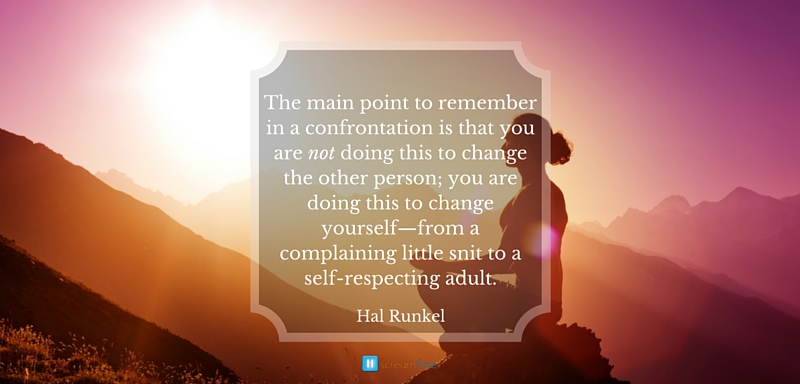How We Learn to Confront
For the last week or so, we’ve been looking at Authentic Self-Representation, a method for confronting others instead of complaining about them.
Here’s how it works. In order to confront more and complain less, our practice of confrontation cannot look just like complaining, except doing it to the person’s face. That has very little chance of creating the connection we crave, or bringing the perpetrator to some shared understanding of our perceived slight. What does have a chance of creating those outcomes, and leaving us feeling stronger in the process, is learning to authentically represent ourselves, regardless of how the other person responds.
See, one of the reasons people give for not confronting someone is that it “won’t do any good.” What they mean is that it’s a waste of breath to confront Mom about her nosiness, or confront the professor about a grade, or confront a friend about her gossip, because doing so won’t change anything. Mom will get offended (and not change her behavior), the professor will be annoyed (and not change the grade), and the friend will get accusatory right back at you (and then go gossip about you some more).
These folks may be right: the people we confront may never change—but that’s not the point of Authentic Self-Representation. And the very act of bringing up our issue does run the risk of offending the other person—but we need to remember that we’ve already been offended. If we wish to continue a relationship with this person, and grow our own self-respect, we need to calmly, and respectfully, represent ourselves.
Think of it like a lawyer at a trial. Who is representing the plaintiff in this case? You are! This is your representation, stating your case. Do you want things to change? Of course! So you stand up for yourself, and let your position be known, as a matter of self-respect. Whether the other person changes as a result of your self-representation is up to them. Whether you, as authentically as possible, let you and your case be known, is up to you.
Here’s what it can look like:
“Dad, I need to talk to you about something. I could be wrong about this, and I could be offending you by saying this, but I don’t appreciate it when you go snooping through my things. While I know I’m not perfect, I believe I am trustworthy, and I would hope you feel the same way.”
Or this:
“Hey ___________, I could be wrong about this, so forgive me if I’m totally off-base. But last night, at the party, it sounded like you were making fun of me, but doing it in a mean way. I can definitely take a joke, but a couple things you said were hurtful. If you need to actually say something serious to me, then do it, but don’t play it off as a cruel joke.”
You don’t have to say this face-to-face, or even on the phone. You can even text this and have the same effect (just be careful, as tone is often lost in text form—there’s a reason you had to take Literature in high school). The main point to remember in a confrontation is that you are not doing this to change the other person; you are doing this to change yourself—from a complaining little snit to a self-respecting adult. Whether the other person changes is up to them.
Is this difficult? Of course. That’s the real reason most people don’t ever do it. We all would rather just complain.
The choice is up to you.
Peace begins with pause,

